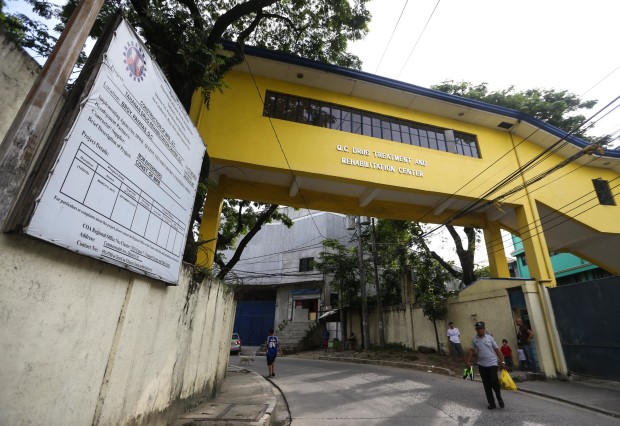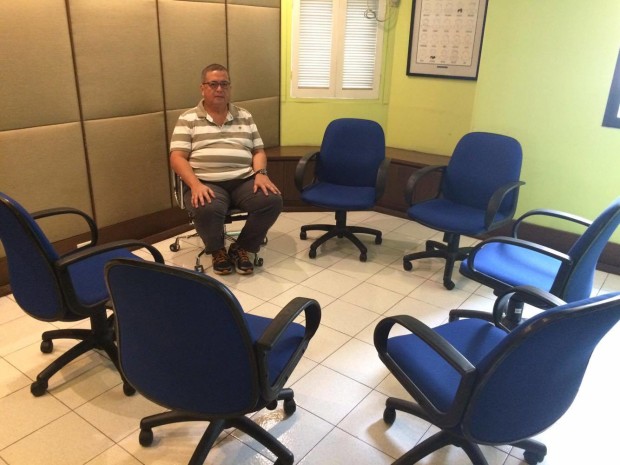LGUs, private sector partner for community-based rehab programs

The facade of the Quezon City Drug Treatment and Rehabilitation Center in Barangay Payatas.
LYN RILLON/PHILIPPINE DAILY INQUIRER
While the money to fund new drug rehabilitation centers and forms of treatment is not yet available or still subject for approval, local government units (LGUs) have begun to forge partnerships with private drug rehabilitation centers and educational institutions to help them in their conduct of community-based treatments programs.
Before the Duterte administration, there was no adequate budget for rehabilitation centers and community-based treatment programs.
The President’s ongoing war on drugs, however, has forced LGUs to seek he help of private institutions because of the lack of immediate resources to train members of their respective city and barangay antidrug abuse councils (Adacs) in handling the hundreds and thousands of drug surrenderers seeking to reform their ways.
READ: DOH cites severe lack of rehab centers during Senate hearing
The Department of Health (DOH) defines community-based rehabilitation as evidence-based interventions given by the community or LGUs. According to the United Nations Office on Drugs and Crime, “It’s a continuum of care from outreach, basic support and reducing the harm from drug use to social integration, with no ‘wrong door’ for entry into the system.”
These interventions do not include in-house rehabilitation. Examples of activities under community-based rehabilition are the dance Zumba, soap making and sporting activities.
Article continues after this advertisementPartnerships help augment training costs
Seagull’s Flight Foundation Inc., a private rehabilitation center in Tagaytay City, has since trained Tahanan, Quezon City’s treatment and rehabilitation center, to conduct their own community-based rehabilitation–with a minimal training fee of P5,000.
Article continues after this advertisementThe same training under the DOH costs almost P30,000, according to Quezon City Vice Mayor Joy Belmonte.
Seagull’s program, which is originally from the United States, was instead redesigned to suit the Asian and Filipino culture, according to Seagull’s founder and executive director Ed Castillo.
READ: Rehab or Rubout Part 3
All its staff members are certified addiction specialists who got their training from the International Center for Certification and Education of Addiction Professionals.
“When I found out from the DOH how much they are charging for the same training, why will I [pay]?” Belmonte said. “I took a risk with Seagull’s. It has American standards; it can’t be far and is probably better.”
Schools also part of effort to bolster rehab programs
New Beginnings Foundation, an outpatient rehabilitation center in Makati City, had helped Muntinlupa City craft its outpatient program years ago. Other LGUs like Laguna have since sought the outpatient center for help, according to Conrado Ayuyao, program director of New Beginnings.
The Makati rehabilitation center offers a 12-step recovery approach. In an outpatient setup, there is no hierarchy or daily tasks, and patients can go in and out everyday. Among the values taught are defiance and being “moldable,” or able to transform. In a circle, patients discuss their shortcoming and what else needs to be done. There are personal coaching and regular monitoring of patients.

At New Beginnings Foundation, founder Dr. Conrado Ayuyao facilitates its in-house community-based rehabilitation program. At P40,000 a month, patients are given the choice to attend weekly counseling. JODEE AGONCILLO/PHILIPPINE DAILY INQUIRER
Aside from private rehabilitation centers, schools, too, are pitching in. Marikina, Bulacan and Pangasinan are the subjects of an ongoing research on community-based rehabilitation programs by behavioral studies students from the University of the Philippines-Manila. According to Arnoel Santos, chief of the Marikina Adac, the research–offered to Marikina for free–is already in its second phase.
Students from another public university and a private graduate school in Pasay City are also conducting their own research for the community-based rehab programs and needs of their own city.
Lack of funds has also forced LGUs to initiate their own fundraising schemes for their respective Adacs.
Valenzuela City, for example, has come up with its own fund-generating scheme from sales from business registration plates for its drug rehabilitation programs. It remains to be seen exactly how much other LGUs will be able to raise and spend for their respective programs.